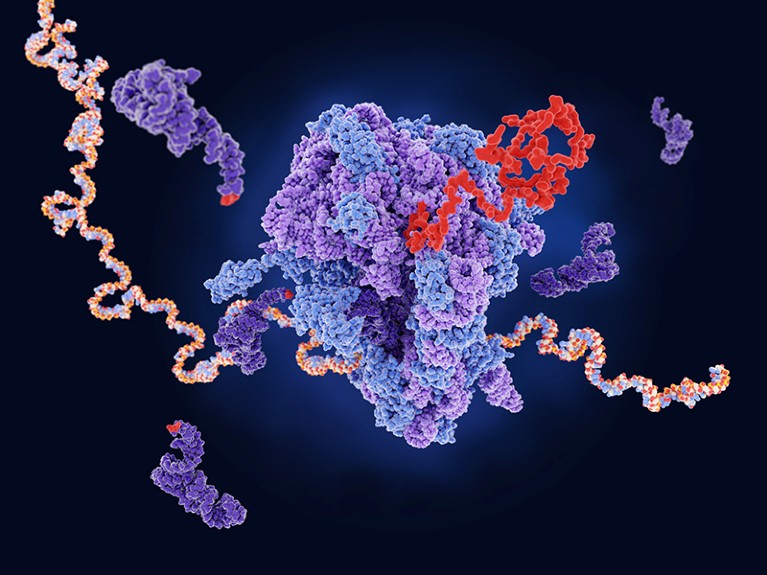Proteins are essential macromolecules that play vital roles in the structure, function, and regulation of cells, tissues, and organs in our body. They are made up of long chains of amino acids, which are the building blocks of proteins. Proteins come in various forms and perform diverse functions, contributing to the overall health and proper functioning of the human body. In this article, we will explore some examples of proteins and their significance.
1. Enzymes:
Enzymes are a crucial type of protein that act as biological catalysts, speeding up chemical reactions in the body without being consumed in the process. Examples of enzymes include amylase, which aids in the digestion of carbohydrates, and catalase, which helps in breaking down hydrogen peroxide into water and oxygen.

Credit: www.nature.com
2. Antibodies:
Antibodies are proteins produced by the immune system to identify and neutralize harmful substances such as bacteria and viruses. These proteins recognize specific antigens and help the immune system in defending the body against infections and diseases.
3. Hemoglobin:
Hemoglobin is a protein found in red blood cells that is responsible for carrying oxygen from the lungs to the body’s tissues and transporting carbon dioxide from the tissues back to the lungs. This vital role of hemoglobin is essential for the proper functioning of the respiratory system.
4. Collagen:
Collagen is the most abundant protein in the human body and is a major component of connective tissues such as tendons, ligaments, and skin. It provides strength and structure to various parts of the body, contributing to the integrity and elasticity of these tissues.
5. Insulin:
Insulin is a protein hormone that regulates the metabolism of carbohydrates and fats in the body. It helps in lowering blood sugar levels by facilitating the uptake of glucose by cells, thereby playing a crucial role in maintaining normal blood sugar levels.

Credit: m.facebook.com
6. Actin and Myosin:
Actin and myosin are proteins found in muscle tissues and are essential for muscle contraction and movement. They work together to generate the force and movement required for various physiological processes, including skeletal muscle movement and cardiac muscle contraction.
7. Casein:
Casein is a group of proteins found in milk and dairy products. It serves as a valuable source of amino acids and is used in the production of various dairy products such as cheese and yogurt. Casein also plays a role in the slow release of amino acids, providing sustained nutrient delivery.
8. Keratin:
Keratin is a structural protein that is the key component of hair, nails, and the outer layer of the skin. It provides strength and resilience to these structures, contributing to their protective and structural functions in the body.
9. Hormones:
Several hormones, such as insulin and growth hormone, are proteins that act as chemical messengers, regulating various physiological processes in the body. These proteins play critical roles in growth, metabolism, and overall physiological balance.
10. Albumin:
Albumin is a protein found in blood plasma and acts as a carrier for various substances, including hormones, fatty acids, and drugs. It also helps in maintaining the oncotic pressure of the blood, contributing to the regulation of fluid balance in the body.
These examples highlight the diverse roles and significance of proteins in the human body. From enzymes that facilitate essential biochemical reactions to structural proteins that provide support and strength to tissues, proteins are integral to the function and maintenance of the human body. Ensuring an adequate intake of protein through a balanced diet is crucial for supporting overall health and well-being.
Frequently Asked Questions For Examples Of Proteins : Unveiling The Power Of Protein
What Are Proteins And Their Importance In Our Body?
Proteins are essential macromolecules that play a crucial role in our body’s structure, function, and overall health. They aid in cell repair, growth, and maintenance, and act as enzymes and antibodies.
How Can Proteins Help In Muscle Building?
Proteins are the building blocks of muscles. When consumed in adequate amounts, they provide the necessary amino acids for muscle repair and growth, aiding in muscle building and recovery post workout.
What Are The Different Dietary Sources Of Proteins?
Proteins can be derived from a variety of sources, including lean meats, poultry, fish, eggs, dairy products, legumes, nuts, and seeds. Incorporating a variety of protein sources ensures a complete amino acid profile in your diet.
Can Proteins Benefit Weight Management?
Yes, proteins can aid in weight management. They promote satiety, which helps control hunger cravings, leading to reduced calorie intake. Additionally, proteins require more energy for digestion, increasing metabolic rate and supporting weight loss or maintenance.
